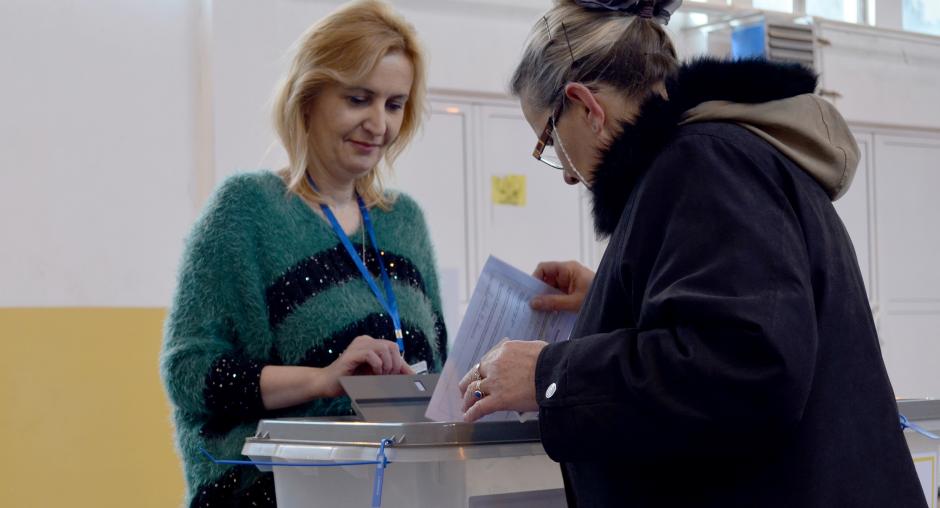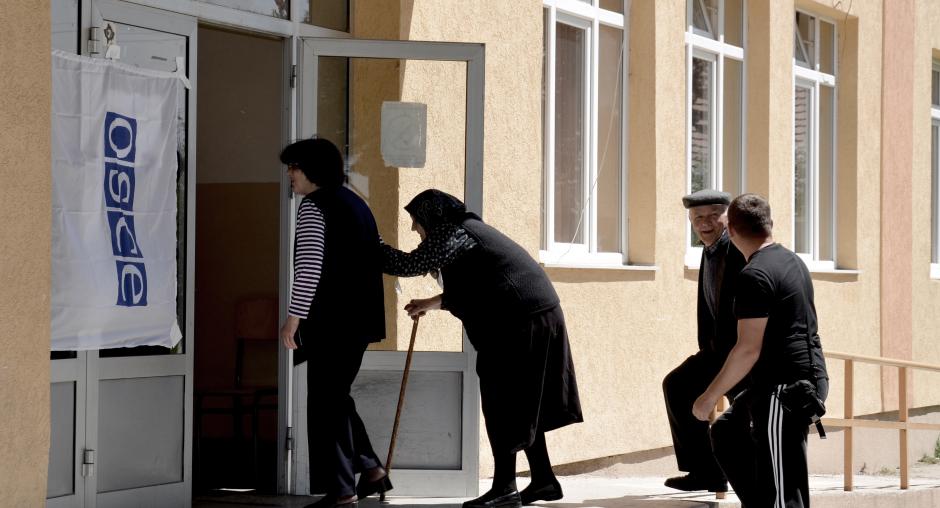Building electoral capabilities in Kosovo – giving a voice to many
Valdete Daka is a well-known face in Kosovo, although she’s neither an artist nor a politician. Daka is a Supreme Court judge - the first and only female to head an independent agency in Kosovo. Appointed in 2010 as the Chair of the Central Election Commission (CEC), the body responsible for organizing and implementing elections in Kosovo, Daka faced many challenges.
In the last four years, the CEC has organized 11 regular and snap elections, run-offs and re-elections – all assessed positively by various local and international organizations. A Kosovo magazine honoured Daka with the ‘Women of the Year’ Award in 2013.
“Looking back, I might have gone through the toughest years of my work experience,” said Daka. “The CEC today has advanced professionally and made great progress. We stand equal with any other regional election body and that is what makes me proud.”
The OSCE Mission in Kosovo established the CEC in 2000. It was initially chaired by the OSCE Heads of Mission until 2008 when this Kosovo institution assumed sole responsibility for organizing elections. The same happened with the Elections Complains and Appeals Panel (ECAP) that manages election-related claims. Since then, the OSCE has supported and advised these two institutions, also known as the election management bodies.
“The co-operation with the OSCE Mission in Kosovo has been excellent. We achieved a lot together. Many more challenges remain but we seem to have a successful way of working so far,” said Daka.
Transfer of responsibility – transfer of knowledge
The Mission’s involvement in the electoral processes developed in three stages. At the first stage, the Mission had its own Elections Department which was responsible for organizing and delivering elections in co-operation with the CEC and its Secretariat. During this period (2000-2007), the Mission organized five rounds of local and central level elections and at the same time worked to train and develop capacities of local institutions that would gradually assume this responsibility.
Transfer of responsibility meant the transfer of knowledge, and this is what we were doing from the very start.
Bujar Basha, National Deputy Chief of Elections, OSCE Mission in Kosovo
Stage two evolved between 2008 and 2014. “During this period, we advised the CEC, provided tailored support and expertise. We sat together on daily basis and worked on various important electoral aspects and those joint efforts seem to have been successful,” said Basha.
The performance of the CEC has been evaluated positively in the past several years. “We are now in a position to reduce further our support to election management bodies and move on to third phase. In 2015 and onwards we will focus on the active review of performance and the integrity of the electoral process. But rather than the Mission having to do this we will work with NGOs to pass this task on to them and to enable them to contribute to building the accountability of trustworthy electoral institutions.”
NGOs take the lead
The appointment of municipal election commissions, the development of a voter list, education campaigns, or the monitoring of elections - these are all important aspects in the delivery of elections which are being discussed in workshops that the Mission has been holding with NGOs.
The OSCE Mission in Kosovo has delivered a series of workshops for ten selected NGOs. The OSCE experts provided a detailed overview of international electoral standards and electoral legal framework in Kosovo and the workshops will expand in 2015 focusing on electoral appeals, financing of political parties as well as the functions and mandates of all relevant bodies.
In addition to in-house expertise, from 8-12 December 2014 the Mission brought international trainers to Prishtinë/Priština to deliver a five-day training program called Building Resources in Democracy, Governance and Elections (BRIDGE) to 20 NGO representatives. The BRIDGE is an internationally recognized professional development programme developed for election administrators.
“Our aim is to enhance the knowledge of NGOs on electoral issues so that they can oversee the performance of the election management bodies and also support the upcoming election reform,” said Basha. “It is important for NGOs to safeguard their legitimacy and stay unbiased while representing a voice of many – and that is what we are focusing on.”
“Monitoring is important because elections are the cornerstone of democracy,” says Ismet Kryeziu from Democracy in Action. “The more I learn about the electoral challenges and the difficulties that the electoral management bodies face in conducting free and fair elections, the more I realise why I have to stay involved. The key to achieving success are monitors and activists who are seen by all sides as neutral – and that is the goal ahead of us.”
Until civil society is ready to fully take over the role of election monitoring, the Mission will continue to monitor the election management bodies and review their performance.
“We still need the OSCE’s professional support, but it has to be more specific. Possible areas include the development of the CEC’s secondary legislation and of recommendations based on performance monitoring,” says Daka.












